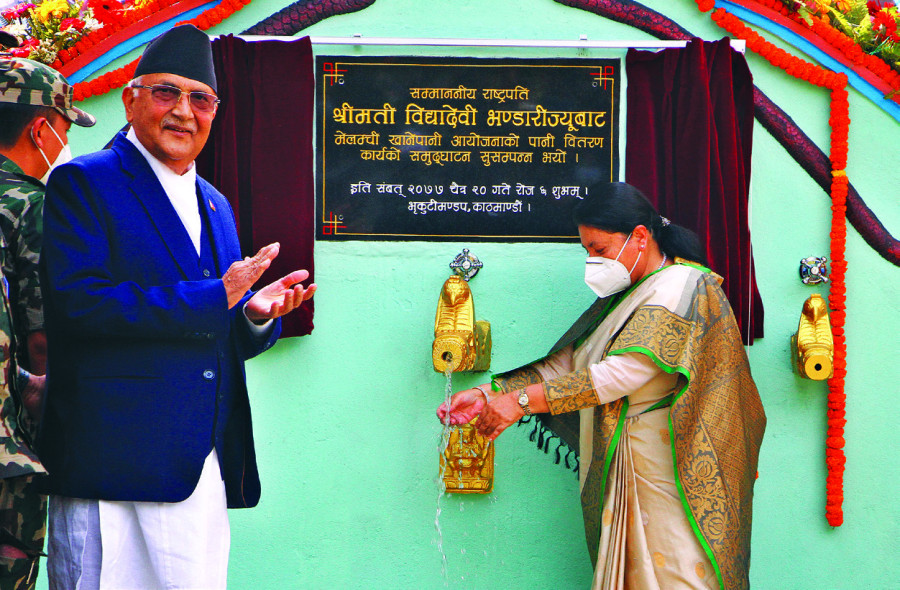National
With President’s complicity, Oli hammers another nail in the coffin of the constitution
Bhandari’s call to form a new government in less than 24 hours at the request of the incumbent one bypassing the due parliamentary process is unconstitutional, experts and political parties say.
Anil Giri
Prime Minister KP Sharma Oli on Thursday recommended that President Bidya Devi Bhandari initiate a process to appoint a new prime minister. President Bhandari promptly obliged.
Experts on constitutional matters were quick to point out that in doing so, both the implementer and the protector of the constitution shredded the top law of the country apart.
Oli’s vote of confidence is pending in Parliament and he has not resigned.
“The prime minister has no right to recommend a new process to form a new government,” said Bhimarjun Acharya, an advocate who specialises on constitutional law.
“Government formation is a process which is Parliament’s prerogative, not something which a Cabinet decides,” said Bipin Adhikari, former dean of the Kathmandu University School of Law.
Following his reappointment on May 13, after losing a trust vote in the House on May 10, Oli is constitutionally bound to prove in the House within 30 days—by June 14—that he has the confidence of the House.
After his trust motion failed in Parliament on May 10, President Bhandari had given the political parties until 9pm of May 13 to form a new government as per Article 76 (2). But the parties failed. President Bhandari then appointed Oli prime minister as per Article 76 (3) as the leader of the party with the highest number of members in the House.
Experts say Oli should have taken the constitutional route and gone for a floor test or resigned.
“There are only two ways to pave the way for the formation of a new government—he fails the confidence vote or resigns,” said Acharya. “It is out and out unconstitutional to request the President to call on the parties to form a new government when there is a legitimate government in place.”
Oli’s request to President Bhandari to pave the way for the formation of a new government comes on the heels of the Janata Samajbadi Party’s decision that it would rather seek to form a government under its own leadership. The decision meant it was not going to support Oli in his confidence vote. That would have led to the fall of the Oli government, thereby prompting the President to invoke Article 76 (5).
The decision to recommend that the President invoke Article 76 (5) was taken by Thursday’s Cabinet meeting.
According to a minister, the prime minister intimated that he would pave the way for the formation of a new government under Article 76 (5).
Experts say Oli overrode the constitutional process by asking the President to invoke Article 76 (5). It’s incumbent upon the President to invoke any article on the formation of the government, not on the government itself, according to them.
Article 76 (5) is invoked only when the prime minister elected under Article 76 (3) fails the confidence vote in the House.
Article 76 (5) says in cases where the prime minister appointed under Article 76 (3) fails to obtain a vote of confidence and any member presents a ground on which he or she can obtain a vote of confidence in the House, the President shall appoint such member as prime minister.
Article 76 (5), in essence, is an extension of Article 76 (2).
Article 76 (2) says in cases where no party has a clear majority in the House, the President shall appoint as prime minister a member of the House who can command majority with the support of two or more parties in the House.
Adhikari, the law professor, called the government recommendation to pave the way for the formation of a new government flawed, prima facie.
“The recommendation does not conform to norms of the parliamentary system. The prime minister should resign to complete the course before recommending the government formation under any other article of the constitution,” Adhikari told the Post. “The government cannot make a request to the President to skip any step without completing the due constitutional process.”
Oli’s intentions, however, appear to be clear. He is bent on getting the House dissolved so that he could justify his December last year’s decision to go for fresh elections.
In what constitutional experts had called a fraud committed on the constitution, Oli on December 20 had suddenly dissolved the House and called snap polls for April 30 and May 10. The Supreme Court, however, overturned his decision and restored the House, in what was described by many as a “landmark decision” and a big blow to Oli. But two weeks later, on March 7, hours before the meeting of the restored House was scheduled, the Supreme Court in a dramatic verdict resurrected Oli’s CPN-UML and Pushpa Kamal Dahal’s Communist Party of Nepal (Maoist Centre) which had merged in May 2018 to form the Nepal Communist Party (NCP).
The court order threw the country’s already fluid politics into uncertainties.
Oli has made all attempts to prove that the House was irrelevant. Insiders say his sudden decision on May 2 to seek a confidence vote in the House on May 10 was part of his bid to get the House dissolved.
After failing the trust vote, he was reappointed, but yet another trust vote failure could, however, have given a chance for the House to survive.
If the Janata Samajbadi Party, which has 34 members (two suspended), could manage to get the support of the Nepali Congress, which has 63 members (two suspended) and the Maoist Centre, which has 49 members, Oli would have been thrown out of Baluwatar.
Analysts say Thursday’s move by Oli is his one last ditch-effort to get the House dissolved.
Since the Janata Samajbadi Party is a divided house, it could be extremely difficult to clinch the required number–136–in less than 24 hours, as the President has given until 5pm Friday to form a new government.
If the Janata Samajbadi does not take the lead, the Nepali Congress and the Maoist Centre could make a move to form a new government, but they will need the support of the Janata Samajbadi.
A prime minister appointed under Article 76 (5), however, needs to secure the vote of confidence within 30 days from the date of the appointment, as laid down by Article 76 (6).
Failure to do so would lead to invocation of Article 76 (7), which says in cases where the prime minister appointed under Article 76 (5) fails to obtain a vote of confidence or the prime minister cannot be appointed, the House would be dissolved. The country then must hold polls to elect a new House of Representatives within six months.
Opposition parties have strongly objected to Oli’s Thursday’s move.
The Nepali Congress, the primary opposition, has called an emergency meeting of the incumbent and former office bearers as well as senior leaders to discuss the latest political situation.
“The President's notice calling on parties to form a new government under Article 76 (5) is illegal and unconstitutional,” senior Congress leader Ram Chandra Poudel told the Post. “How can she accept such a recommendation letter from the prime minister unless he resigns or fails a vote of confidence?”
Poudel described the prime minister and President’s acts as a choreographed ploy to overthrow the constitution.
“If the prime minister thinks he will fail the confidence vote, which is mandatory as per the constitutional provision, he should resign and let the President invoke the required article,” said Poudel. “How can one individual lawmaker prove a majority in 20 hours? The prime minister and the President have plotted a conspiracy to dissolve the House.”
Oli’s move follows some dramatic events earlier in the day.
In the afternoon, the Supreme Court scrapped the appointment of seven ministers, including Ram Bahadur Thapa, of the Oli Cabinet, calling it unconstitutional.
Thapa, a long-time Maoist leader, had defected to Oli. The Maoist Centre had sacked Thapa as a member of the National Assembly last month. But he was immediately appointed to his post of home minister by Oli.
Hours after the court order to scrap the appointment of Thapa and six other ministers, all former Maoist leaders, Thapa lost the National Assembly by-election to Khim Lal Devkota, who was backed by Oli’s nemesis Madhav Kumar Nepal.
Analysts say the turn of events in the day also prompted Oli to take such an erratic decision of recommending a new process to form a new government while himself being the legitimate prime minister.
A UML leader, however, said that Oli’s Thursday decision is in line with what he has believed all along.
“The prime minister has time and again said that this Parliament's relevance is over,” said Subas Chandra Nembang, a UML leader and close aide to Oli. “I believe the prime minister has apprised all the stakeholders of his move.”
Nembang, the two-time chair of the Constituent Assembly, who has drawn flak for not speaking a word when Oli violated the constitution in the past on Thursday once again defended his party chair.
“The prime minister does not need to resign,” said Nembang, himself a seasoned lawyer and known as an expert on constitutional affairs, who oversaw the entire constitution-drafting process. “When we have to go for another process of government formation, the prime minister need not resign because this government is the continuation of the same government.”
Nembang refused to go into the constitutional provision that requires Oli to secure the vote of confidence.
“[Our] prime minister never goes against the letter and spirit of the constitution,” he said.
Constitutional experts, however, say ever since Oli came to power, he has shown utter disregard for the constitution and rule of law. From the ordinance on the Constitutional Council Act to House dissolution, they say Oli has attempted to destroy the system one step at a time.
“What happened today in collusion between the prime minister and the President,” said Acharya, the constitutional lawyer, “is nothing but a well-choreographed conspiracy to destroy the system and the constitution–the top law of the country.”
(Tika R Pradhan contributed reporting)




 12.12°C Kathmandu
12.12°C Kathmandu













